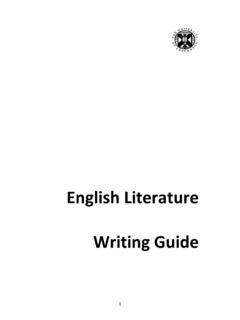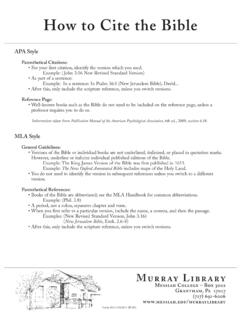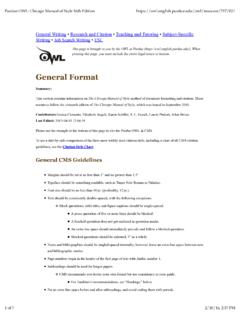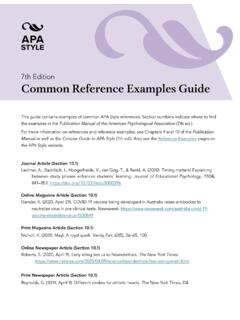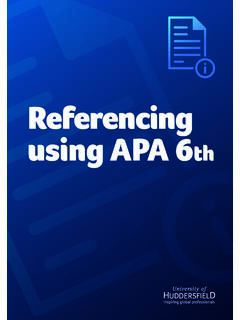Transcription of IMPORTANCE OF KNOWLEDGE MANAGEMENT IN THE …
1 162 Turkish Online Journal of Distance Education-TOJDE January 2015 ISSN 1302-6488 Volume: 16 Number: 1 Article 11 IMPORTANCE OF KNOWLEDGE MANAGEMENT IN THE HIGHER EDUCATIONAL INSTITUTES Ms. Sangeeta NAMDEV DHAMDHERE Librarian, Modern College of Arts, Science and Commerce, Ganeshkhind, Pune, INDIA ABSTRACT Every academic institution contributes to KNOWLEDGE . The generated information and KNOWLEDGE is to be compiled at central place and disseminated among the society for further growth. It is observed that the generated KNOWLEDGE in the academic institute is not stored or captured properly It is also observed that many a times generated information or KNOWLEDGE in the academic institute is not known to any one and remains as grey literature, which might be useful if proper recoding is maintained in the organization. In fact academic environment is treasure of KNOWLEDGE but it is not organized properly and hence utility is also lacking and cause for the repetitions of the activity.
2 This project is undertaken under Board of University and Colleges, University of Pune for finding IMPORTANCE of KM of past KNOWLEDGE of an institute. Also study on data capture, data analysis, data categorization, data mining, data mapping, KNOWLEDGE mapping, concept mapping, indexing, linking and repackaging of KNOWLEDGE , tools, techniques, strategies and copyright issues in sharing this KNOWLEDGE through KNOWLEDGE base. Keywords: KNOWLEDGE MANAGEMENT , KNOWLEDGE sharing, Tacit KNOWLEDGE MANAGEMENT , KNOWLEDGE MANAGEMENT strategies, KNOWLEDGE MANAGEMENT policies in higher education. INTRODUCTION KNOWLEDGE MANAGEMENT (KM) is a new immerging field in the academic environment. Many upcoming conferences and seminars at national and International level are on KNOWLEDGE MANAGEMENT . Many International Universities are actively participating in KM related activities and doing research.
3 It is now becoming popular in Education field due to need to disclose the intellectual power available in institution for sharing experiences. It has great potential and should have equal and even greater significance for education sector. KNOWLEDGE builds on KNOWLEDGE and past events helps in generating new KNOWLEDGE . The main source of generation of KNOWLEDGE is human efforts which are developed through conducting good educational activities, research activities and generating innovative concepts in the area of interest. All KNOWLEDGE generating organizations like industries, R and D centers, and higher education academics from colleges to universities are in search of new concepts in their subject of interest and also contribute to KNOWLEDGE through various means. They are considered as KNOWLEDGE Houses where KNOWLEDGE flows from teachers to students and new KNOWLEDGE is created. The information generated is covered in different forms and 163 sources like books, journal articles, thesis or dissertations, technical reports, fact finding reports, case studies, patents, development of test methods and standards, different scholarly communications etc.
4 Every academic institution contributes to KNOWLEDGE . The generated information and KNOWLEDGE is to be compiled at central place and disseminated among the society for further growth. It is observed that the generated KNOWLEDGE in the academic institute is not stored or captured properly It is also observed that many a times generated information or KNOWLEDGE in the academic institute is not known to any one and remains as grey literature, which might be useful if proper recoding is maintained in the organization. In fact academic environment is treasure of KNOWLEDGE but it is not organized properly and hence utility is also lacking and cause for the repetitions of the activity. KNOWLEDGE MANAGEMENT (KM) in educational institution makes good sense and a good combination of intellectual output of the academic organization if preserved well using technology.
5 The KM efforts could be monitored by the libraries and disclose it along explicit KNOWLEDGE to the users, but tacit KNOWLEDGE compilation is difficult as it is preserved at individual level. But librarian could make better efforts in making available such kind of KNOWLEDGE with the support of the KNOWLEDGE developers using technology to capture tacit KNOWLEDGE generated in the organization. In this role of each and every staff and student is very important as its not sole responsibility of Librarian. Rashtriya Ucchatar Shikshan Abhiyan (RUSA) is giving IMPORTANCE to employability of the students. The new goal for educational institutions today is to develop such KNOWLEDGE base of student s KNOWLEDGE (both tacit and explicit) including their capabilities and skills with the help of latest technologies. It will help to students to pick up their capabilities, talents, prior KNOWLEDGE and experience and work on that to enlarge and adapt this KNOWLEDGE more effectively and easier to cope up with present environment.
6 This KNOWLEDGE base can be useful to students as self motivator, self KNOWLEDGE manager, team building, innovator and problem solving agent. This research is for finding IMPORTANCE of KM of past KNOWLEDGE of an institute. Also study on data capture, data analysis, data categorization, data mining, data mapping, KNOWLEDGE mapping, concept mapping, indexing, linking and repackaging of KNOWLEDGE , tools, techniques, strategies and copyright issues in sharing this KNOWLEDGE through KNOWLEDGE base. ORIGIN OF THE RESEARCH PROBLEM Based on the various considerations to develop a KNOWLEDGE MANAGEMENT or Institutional Repository or a KNOWLEDGE Base for an academic institution in the ICT era and digital media, it is found economical and useful similarly new emerging strategies which enhanced the accessibility to traditional, grey and institutional KNOWLEDGE by developing open access to literature.
7 Self archiving trends, sharing of thoughts using web tools are added in the process of KM development. Developed countries have managed KM however developing countries are pursuing to this activity. In India among many projects few projects like Shodh Ganga , Vidya Nidhi , TKDL projects and scholarly communications in the form of different publications, are developed to communicate information to users. To support such activities educational institutes have to initiate the development of KNOWLEDGE base, which may be benefited to develop a network of KNOWLEDGE developed at academic institutional level using technology. A preliminary effort towards development of KNOWLEDGE Base for an academic institution will be tried in this project. 164 It is present need of an organization to transform and recreate themselves by destroying the existing KNOWLEDGE system and by inventing new ways of thinking and doing.
8 The KNOWLEDGE has to built on its own, frequently enquiries, intensive and laborious interaction among the staff, students and group of the institute rather acquiring KNOWLEDGE from outside. The institutes going to involve in to cope dynamically with the changing environment needs to create information and KNOWLEDGE efficiently. The staff and students should be active in innovation. Each individual in the institute must have responsibility to create new KNOWLEDGE and transfer it into organizational KNOWLEDGE . Author observed that there are very few rare educational institutes in India we found who capture their students and teachers tacit KNOWLEDGE too and preserve to give access to society to build new KNOWLEDGE . These educational institutes conduct various activities and strategies for staff and students to inculcate research culture and create new KNOWLEDGE (discussed in detail in this report).
9 Most of them are published as article, project reports or theses form and preserved. But apart from this explicit recorded KNOWLEDGE many times tacit KNOWLEDGE of people (hidden in the mind) is not recorded properly. In IT industry various strategies are applied to capture tacit KNOWLEDGE of experts and they keep record. If not done and if expert leaves the job for better opportunity in between that industry suffers. Similarly selected tacit KNOWLEDGE capturing activities must be recorded in educational institutes. They are no doubt will be used for submitting reports asked by various funding and grading agencies, universities, industries, foreign collaborations. Also to strengthen the alumni association also this KNOWLEDGE MANAGEMENT practice will be very powerful. RESEARCH OBJECTIVES The main objectives of this research project are To create KNOWLEDGE base of captured tacit and explicit KNOWLEDGE of staff and students/ Institute To study the application of ICT and web technology for creating KNOWLEDGE base To share resources or KNOWLEDGE of an Institute To preserve KNOWLEDGE of an Institute To study the current situation and/or problems of KNOWLEDGE MANAGEMENT practices and strategies used in the selected NAAC A Grade academic institutes in Pune.
10 To identify and analyze the development of KNOWLEDGE MANAGEMENT processes, strategies used including critical success factors of KNOWLEDGE MANAGEMENT . To organize and manage tacit as well as explicit KNOWLEDGE of the organization To find out biggest hurdles in implementing KM in educational institutes. This article provide guidelines for educational institutes regarding collecting, capturing, analyzing, classifying, indexing, repackaging and sharing the explicit and tacit KNOWLEDGE recorded and captured through various activities conducted in institutes for staff and students using technology. 165 REVIEW OF RESEARCH AND DEVELOPMENT IN THE SUBJECT International Status KNOWLEDGE MANAGEMENT education sector is being spoken since 2000. Later few researchers like Nanoka, Takeuchi, Sveibi, Polanyi, etc developed different tools, methods, models and theories in this area.











